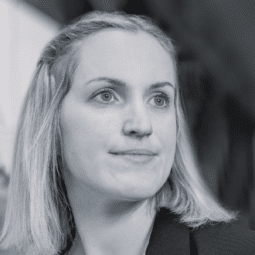|
Getting your Trinity Audio player ready...
|
|
LISTEN TO AUDIO VERSION:
|
Digital transformation and trends in banking

Hello Jörg, you initiated the BankingHub eight years ago as a zeb project together with Tristan Holl and Laura Pfannemüller. As the current editors-in-chief of the platform, we are therefore particularly interested in your drive or motivation to launch the BankingHub back then. What were the original intentions behind the BankingHub?
Initially, the aim of the BankingHub was to actively share zeb’s knowledge and opinions with interested recipients from the banking sector. Given the strong target group orientation of the offer, we considered this type of content marketing ideal for zeb, which is characterized by a high degree of expertise. Right up to this day, the BankingHub has remained a platform on which individual zeb employees can also demonstrate their knowledge or argue their opinion on various topics.
What developments in the European banking sector and in the fintech industry have had a particular influence on you during this time (2014–2016)?
The years from 2012 onwards were strongly characterized by digitalization topics that saw a rapid increase in relevance. One of the key trends was and still is the sharing of knowledge and information, true to the motto “sharing is caring”, which we wanted to adopt by introducing the BankingHub. More broadly, these were the years in which banks increasingly set themselves a clear “digital agenda”, and of course zeb wanted to support this trend.
New world: banking as a service, embedded finance and crypto
After eight years at zeb, you moved to KI finance in Cologne, a consulting boutique with a focus on digital banking, and joined Solaris in 2016, where you have been a member of the management board since 2020. The idea behind Solaris’ business model is to offer a banking-as-a-service platform, which makes you a tech innovator in the market. Does Solaris see itself as a competitor to banks or rather as a supporting partner with a complementary offer?
Solaris Group delivers concrete solutions to respond to the major trend of the past years in financial services: we enable embedded finance offers that make financial services more accessible and attainable for customers. Solaris is a technology supplier with a banking license and hence only competes indirectly with traditional banking offers; it is therefore a complementary offering.
Open banking or embedded finance enables new competitors to deliver new services and added value via open application programming interfaces (APIs) and to open up additional value chains in the financial services industry. According to a 2021 Solaris forecast, the embedded finance market will achieve a volume of around €230 billion by 2025.[2] What trends and topics related to embedded finance and platform banking are particularly exciting for you right now? Where do you think embedded finance is heading?
In their market assessments, all relevant experts agree that embedded finance will be the key trend in financial services in the medium and long term. We respond to this by offering a wide range of products and licenses (CRR license in Europe, EMI licenses in Europe and the UK), which enable all major use cases in the retail and largely also SME sector. Embedded finance offers will not only increase in presence, but also become more specialized, which will ultimately be to the customers’ benefit.
Going forward, do you want to strengthen your position in the securities business? What about positioning Solaris in the crypto world?
We already have a clearly defined offering in the crypto world: custody and trading of digital assets, accessible via simple RESTful APIs. In the securities business, we are currently launching an initial product range, which we will expand further in line with market demand.
BankingHub-Newsletter
Analyses, articles and interviews about trends & innovation in banking delivered right to your inbox every 2-3 weeks
"(Required)" indicates required fields
Next goals and further development of Solaris
Solaris’ combined net turnover in 2021 amounted to over €100 million, which corresponds to a growth of over 90 percent compared to the previous year. This year, Solaris is targeting a sustainable growth in earnings of 40 to 60 percent. Jörg, where do you see Solaris’ long-term ambition and what milestones are next on the agenda? And what’s on your personal strategic agenda right now as Chief Platform Officer?
We have specified our vision as follows: “[…] to create a world where financial services seamlessly sync with life.” To achieve this, we will further consolidate and expand our market-leading position in Europe. In my specific responsibility for Solaris Group’s “production platform”, this translates into continuously developing the platform in terms of product offering, further increasing the efficiency and quality of all banking processes and meeting the highest technological and security standards in all dimensions. Financial services are based on trust, and the quality of our offering is ultimately the most important delivery dimension to earn it.
What challenges have you faced so far at Solaris and how did you deal with them?
Striking a balance between extremely rapid growth, the specific features of a B2B2X business model and the need to constantly increase efficiency in all processes remains the key challenge. As a team, we try to achieve this through a high degree of transparency regarding the goals while at the same time decentralizing decision-making authority in such a way that each and every one of us can make decisions without losing sight of the big picture.
“In ten years’ time, banking will be …”
Last but not least: how would you complete the following sentence? “In ten years’ time, banking will be …”
“… significantly more decentralized, closer to the customer and offering the best answers for each use case.” That’s what we learned as individuals in the app economy of the last decade, and the financial industry has nowhere near responded to it yet. Embedded finance, supported by efficient central service providers, is the only possible answer to this diversity.
And what are your wishes for the BankingHub’s future development?
I wish for the BankingHub to continue to increase its readership and to reach high interaction rates with consumers. Achieving this was the essential task in the first few years and will certainly continue to be a huge endeavor given the increasingly broad content offering available.
Dear Jörg, thank you very much for this interesting discussion! We wish you and your team continued success!




